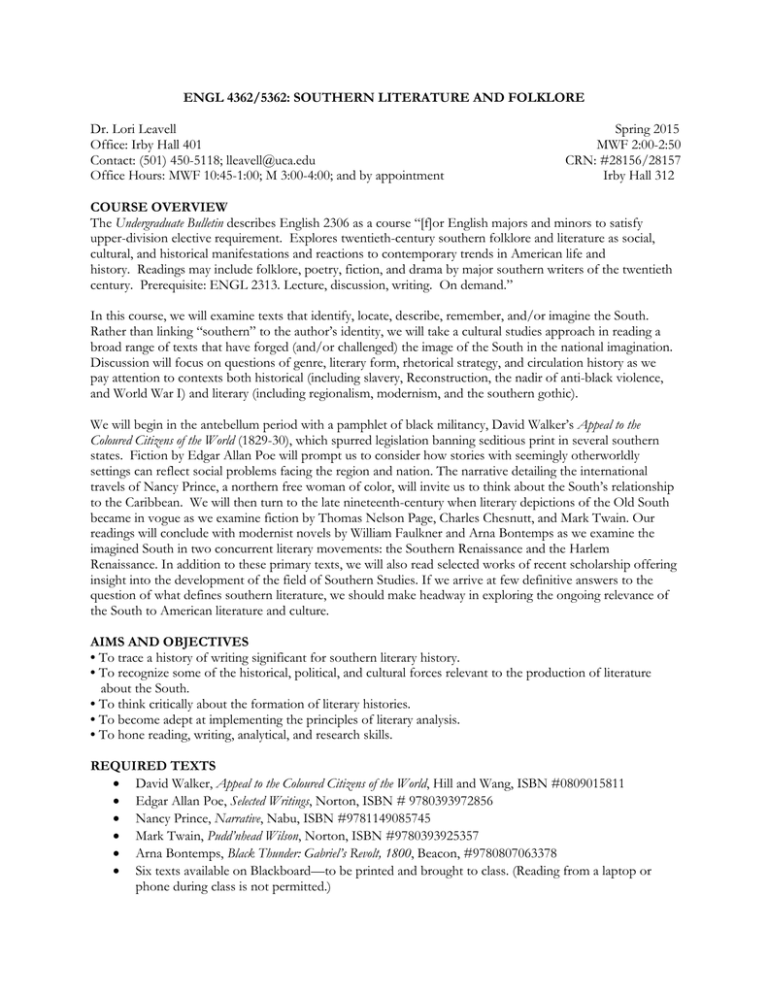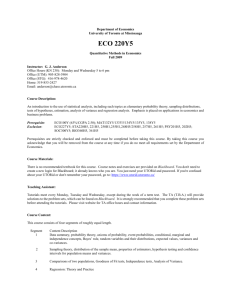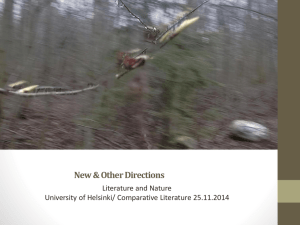ENGL 4362/5362: SOUTHERN LITERATURE AND FOLKLORE Dr
advertisement

ENGL 4362/5362: SOUTHERN LITERATURE AND FOLKLORE Dr. Lori Leavell Office: Irby Hall 401 Contact: (501) 450-5118; lleavell@uca.edu Office Hours: MWF 10:45-1:00; M 3:00-4:00; and by appointment Spring 2015 MWF 2:00-2:50 CRN: #28156/28157 Irby Hall 312 COURSE OVERVIEW The Undergraduate Bulletin describes English 2306 as a course “[f]or English majors and minors to satisfy upper-division elective requirement. Explores twentieth-century southern folklore and literature as social, cultural, and historical manifestations and reactions to contemporary trends in American life and history. Readings may include folklore, poetry, fiction, and drama by major southern writers of the twentieth century. Prerequisite: ENGL 2313. Lecture, discussion, writing. On demand.” In this course, we will examine texts that identify, locate, describe, remember, and/or imagine the South. Rather than linking “southern” to the author’s identity, we will take a cultural studies approach in reading a broad range of texts that have forged (and/or challenged) the image of the South in the national imagination. Discussion will focus on questions of genre, literary form, rhetorical strategy, and circulation history as we pay attention to contexts both historical (including slavery, Reconstruction, the nadir of anti-black violence, and World War I) and literary (including regionalism, modernism, and the southern gothic). We will begin in the antebellum period with a pamphlet of black militancy, David Walker’s Appeal to the Coloured Citizens of the World (1829-30), which spurred legislation banning seditious print in several southern states. Fiction by Edgar Allan Poe will prompt us to consider how stories with seemingly otherworldly settings can reflect social problems facing the region and nation. The narrative detailing the international travels of Nancy Prince, a northern free woman of color, will invite us to think about the South’s relationship to the Caribbean. We will then turn to the late nineteenth-century when literary depictions of the Old South became in vogue as we examine fiction by Thomas Nelson Page, Charles Chesnutt, and Mark Twain. Our readings will conclude with modernist novels by William Faulkner and Arna Bontemps as we examine the imagined South in two concurrent literary movements: the Southern Renaissance and the Harlem Renaissance. In addition to these primary texts, we will also read selected works of recent scholarship offering insight into the development of the field of Southern Studies. If we arrive at few definitive answers to the question of what defines southern literature, we should make headway in exploring the ongoing relevance of the South to American literature and culture. AIMS AND OBJECTIVES • To trace a history of writing significant for southern literary history. • To recognize some of the historical, political, and cultural forces relevant to the production of literature about the South. • To think critically about the formation of literary histories. • To become adept at implementing the principles of literary analysis. • To hone reading, writing, analytical, and research skills. REQUIRED TEXTS David Walker, Appeal to the Coloured Citizens of the World, Hill and Wang, ISBN #0809015811 Edgar Allan Poe, Selected Writings, Norton, ISBN # 9780393972856 Nancy Prince, Narrative, Nabu, ISBN #9781149085745 Mark Twain, Pudd’nhead Wilson, Norton, ISBN #9780393925357 Arna Bontemps, Black Thunder: Gabriel’s Revolt, 1800, Beacon, #9780807063378 Six texts available on Blackboard—to be printed and brought to class. (Reading from a laptop or phone during class is not permitted.) REQUIRED EVENTS The College of Liberal Arts Student Research Symposium will take place on Wednesday and Thursday, April 22 and 23. These two days will consist of student presentations, and the Symposium guest, Dr. Lloyd Pratt (University of Oxford, England), will deliver a talk each night. In lieu of our class meetings on April 20 and 22, you are required to attend one panel of student presentations, and you are required to attend both talks. The final exam will include a written component based on these talks. ATTENDANCE, PREPARATION, PARTICIPATION, CIVILITY Attendance: More than three absences/instances of tardiness is considered excessive. Three absences (for whatever reason) will not alter one’s grade; however, each subsequent absence/tardiness will result in the deduction of five points from the final point total. Please be aware that seven absences, regardless of the reasons, will result in a grade of WF/F for the course. Preparation: To prepare for class, read the assigned material, take notes, post to Blackboard and read your classmates’ discussion questions, and come prepared to contribute thoughtful ideas. Participation and Civility: This course is discussion-based, its success depending on the contributions of the participants. If a full schedule or personal matters will prevent full participation, please take the course another time. Bring to class the readings to be discussed. A few texts—secondary sources—have been placed on Blackboard (indicated with “BB” on the day-by-day schedule) and must be printed and brought to class. This course expects that participants will extend respect and courtesy to one another and to the literature. In this spirit, please be on time and remain engaged for the duration of the class. Take care to power down and put away all electronic devices before class begins. Make it a point to voice comments and questions every class while being respectful and considerate of others so that no one person dominates the discussion. ASSIGNMENTS The course is designed so that each assignment builds on the previous one. Twice a week, you will post to Blackboard questions generated by the readings to be discussed in the upcoming class. Idea papers provide an opportunity to expand on those questions. These assignments will help prepare you to select a research topic, which will focus the short paper, abstract, and expanded paper. Reading and talking with one another no doubt will contribute to the development of our ideas, and the structure of the course—discussion-based with several small writing assignments, culminating in a larger research paper—is organized to facilitate that development. (Graduate Students: Please notice the assignment substitutions indicated in bold.) Blackboard Questions: On Mondays and Wednesdays by 10 am, submit to Blackboard one discussion question provoked by the readings assigned for the day’s class. (You need not post on days for which a Workshop is scheduled or a paper is due—unless a new reading has also been assigned.) These questions will help structure the lecture and discussion. Late submissions will not be accepted. Five Writing Workshops: Writing workshops provide the opportunity to offer feedback on your classmates’ writing and receive feedback on your own. A complete draft of the upcoming paper is required for admittance to the workshops, and participation is assessed according to quality of offered feedback. Latecomers cannot participate. Three Idea Papers (2 pages): These short papers provide the opportunity to develop ideas generated from the course readings, discussion, and Blackboard posts. Late Idea Papers will not be accepted. Abstract (1-2 pages): The abstract should articulate the basic questions that your expanded paper will address, preview how your argument will unfold, and situate your argument among critical conversations. It should demonstrate feedback offered on the short paper has been addressed and that subsequent research has been completed. Short Paper (4-5 pages): Approval of research topic must be secured. This paper should focus on one or two of the class’s primary sources. Incorporate 3-4 secondary sources. Late papers are marked down half of a letter grade for each day they are late. (Graduate students: Prepare a short paper 7-8 pages in length, and incorporate 5-6 secondary sources.) Expanded Paper (8-9 pages): This paper will build on the short paper. It should demonstrate that feedback on the short paper has been addressed and that additional research has shaped the argument (citing 7-8 total secondary sources). Late papers are marked down half of a letter grade for each day they are late and will not be accepted after April 22. Submit the short paper with comments along with the expanded paper. (Graduate students: Prepare expanded papers 12-14 pages in length with 10-12 secondary sources.) Final Essay Exam (5 pages): A take-home exam, consisting of two components: (A) 2-page response (25 points) to Dr. Lloyd Pratt’s two talks and (B) 3-page response to an exam question regarding our readings for the semester (50 points). (Graduate students: In lieu of the exam, prepare an annotated bibliography [5 pages/ 7 sources, each annotation 150-200 words] along with an introductory essay [6 pages].) POINT DISTRIBUTION Undergraduate: Blackboard Questions x 20 Workshops x 5 Idea Papers x 3 Abstract Short Paper Expanded Paper Final Essay Exam Total Points Graduate: Blackboard Questions x 20 = 40 *Workshops x 3 = 15 Idea Papers x 3 = 60 Abstract = 25 Short Paper = 75 Expanded Paper = 100 *Annotated Bibliography + essay = 75 *Presentation = 30 Total Points = 420 (Asterisk = distinction from undergraduate requirements. Graduate Students need not attend Workshops # 4 and #5.) = 40 = 25 = 60 = 25 = 75 = 100 = 75 = 400 Points will be converted to percentages to yield final grades according to the following scale: 90% - 100% = A 80% - 89% = B 70% - 79% = C 60% - 69% = D Below 60% = F ACADEMIC INTEGRITY The University of Central Arkansas affirms its commitment to academic integrity and expects all members of the university community to accept shared responsibility for maintaining academic integrity. Students in this course are subject to the provisions of the university’s Academic Integrity Policy, approved by the Board of Trustees as Board Policy No. 709 on February 10, 2010, and published in the Student Handbook. Penalties for academic misconduct in this course may include a failing grade on an assignment, a failing grade in the course, or any other course-related sanction that the instructor determines to be appropriate. Continued enrollment in this course affirms a student’s acceptance of this university policy. THE WRITING CENTER The Center will help you work on your writing at any stage of development. To make an appointment, submit a paper for online tutoring, or to find out about drop-in hours, visit http://www.uca.edu/writingcenter/appointment.php. They also offer useful online resources at http://www.uca.edu/writingcenter/online_resources.php. The Academic Success Center is also available to help you with all aspects of college work. Check them out at http://www.uca.edu/ucollege/asc.php. EVALUATIONS Student evaluations of a course and its professor are a crucial element in helping faculty achieve excellence in the classroom and the institution in demonstrating that students are gaining knowledge. Students may evaluate courses they are taking starting on the Monday of the twelfth week of instruction through the end of finals week by logging in to myUCA and clicking on the Evals button on the top right. EMERGENCY PROCEDURES SUMMARY An Emergency Procedures Summary (EPS) for the building in which this class is held will be discussed during the first week of this course. EPS documents for most buildings on campus are available at http://uca.edu/mysafety/bep/. Every student should be familiar with emergency procedures for any campus building in which he/she spends time for classes or other purposes. Title IX disclosure: If a student discloses an act of sexual harassment, discrimination, assault, or other sexual misconduct to a faculty member (as it relates to “student-on-student” or “employee-on-student”), the faculty member cannot maintain complete confidentiality and is required to report the act and may be required to reveal the names of the parties involved. Any allegations made by a student may or may not trigger an investigation. Each situation differs and the obligation to conduct an investigation will depend on those specific set of circumstances. The determination to conduct an investigation will be made by the Title IX Coordinator. For further information, please visit: https://uca.edu/titleix. *Disclosure of sexual misconduct by a third party who is not a student and/or employee is also required if the misconduct occurs when the third party is a participant in a university-sponsored program, event, or activity. UNIVERSITY POLICIES If you have questions about the university’s academic policies or any other matters, please consult the relevant sections of the UCA Student Handbook. UCA adheres to the requirements of the Americans with Disabilities Act. If you need an accommodation under this Act due to a disability, contact the UCA Office of Disability Services at 450-3135. Friday, 1/9 Introductions Week 1 Monday, 1/12 Wednesday, 1/14 Friday, 1/16 Hobson, “The Savage South” (BB) Hobson, continued Workshop #1 Week 2 Monday, 1/19 Wednesday, 1/21 Friday, 1/23 Holiday Honoring Dr. Martin Luther King, Jr. Idea Paper #1 Due; Walker, Appeal (Wilentz’s Introduction and 1-34) Walker, Appeal (35-78 and Appendix I and II) Week 3 Monday, 1/26 Wednesday, 1/28 Friday, 1/30 Poe, “Metzengerstein” (81-9) and “The Fall of the House of Usher” (199-215) Poe, “Hop Frog” (421-28) Teressa A. Goddu, “Rethinking Race and Slavery in Poe Studies” (BB) Week 4 Monday, 2/2 Wednesday, 2/4 Friday, 2/6 Poe, Narrative of Aruthur Gordon Pym (429-72) Poe, Narrative of Aruthur Gordon Pym (473-526) Poe, Narrative of Aruthur Gordon Pym (526-63) Week 5 Monday, 2/9 Wednesday, 2/11 Workshop #2 Idea Paper #2 Due; Narrative of Nancy Prince (1-56) Friday, 2/13 Narrative of Nancy Prince (56-89) Week 6 Monday, 2/16 Wednesday, 2/18 Friday, 2/20 Thomas Nelson Page, “No Haid Pawn” (BB) Charles Chesnutt, “The Marked Tree” (BB) Twain, Pudd’nhead Wilson (1-36) Week 7 Monday, 2/23 Wednesday, 2/25 Friday, 2/27 Twain, Pudd’nhead Wilson (37-85) Twain, Pudd’nhead Wilson (85-122) Workshop #3 Week 8 Monday, 3/2 Wednesday, 3/4 Idea Paper #3; Faulkner, Absalom, Absalom! (1-69) Meet in Torreyson #117: Research Methods; Hoefer, “A Qualitative Consideration of Current Quantitative Souths” (BB) Friday, 3/6 Faulkner, Absalom, Absalom! (70-140); Paper Topics Due Week 9 Monday, 3/9 Wednesday, 3/11 Friday, 3/13 Faulkner, Absalom, Absalom! (141-234) Faulkner, Absalom, Absalom! (235-87) Faulkner, Absalom, Absalom! (288-309) Week 10 Monday, 3/16 Wednesday, 3/18 Friday, 3/20 Workshop #4 Barbara Ladd, “‘The Direction of the Howling’: Nationalism and the Color Line in Absalom, Absalom!”(BB) Short Paper Due; Research Methods in Torreyson #117 Spring Break: 3/23 – 3/27 Week 11 Monday, 3/30 Wednesday, 4/1 Friday, 4/3 Week 12 Monday, 4/6 Wednesday, 4/8 Friday, 4/10 Week 13 Monday, 4/13 Wednesday, 4/15 Friday, 4/17 Week 14 Monday, 4/20 Wednesday, 4/22 Thursday, 4/23 Friday, 4/24 Arna Bontemps, Black Thunder (9-82) Arna Bontemps, Black Thunder (83-118); Abstract Due Arna Bontemps, Black Thunder (120-56) Arna Bontemps, Black Thunder (157-94) Arna Bontemps, Black Thunder (195-224) Catch-up and Graduate Students’ Presentations (Graduate Students: Annotated Bibliography Due) Workshop #5 Writing Concerns Expanded Paper Due; Review for Final Exam In lieu of class: Attend Dr. Pratt’s Talk on Thursday @ 5:00 pm In lieu of class: Attend Symposium session either Wed. or Thurs. and Dr. Lloyd Pratt’s Talk at Faulkner County Library @ 7:00 pm Dr. Lloyd Pratt’s Talk at Student Center @ 5:00 pm Study Day (Graduate Students: Expanded Paper Due)





